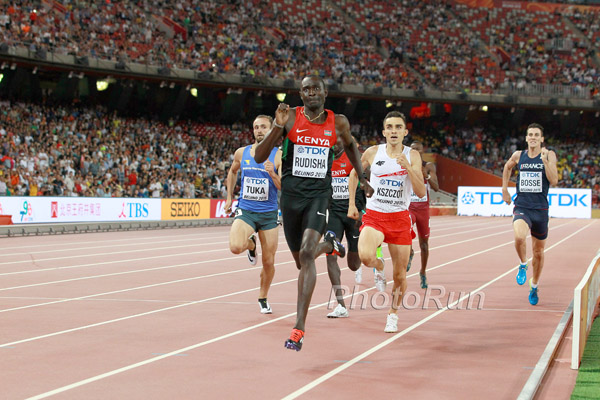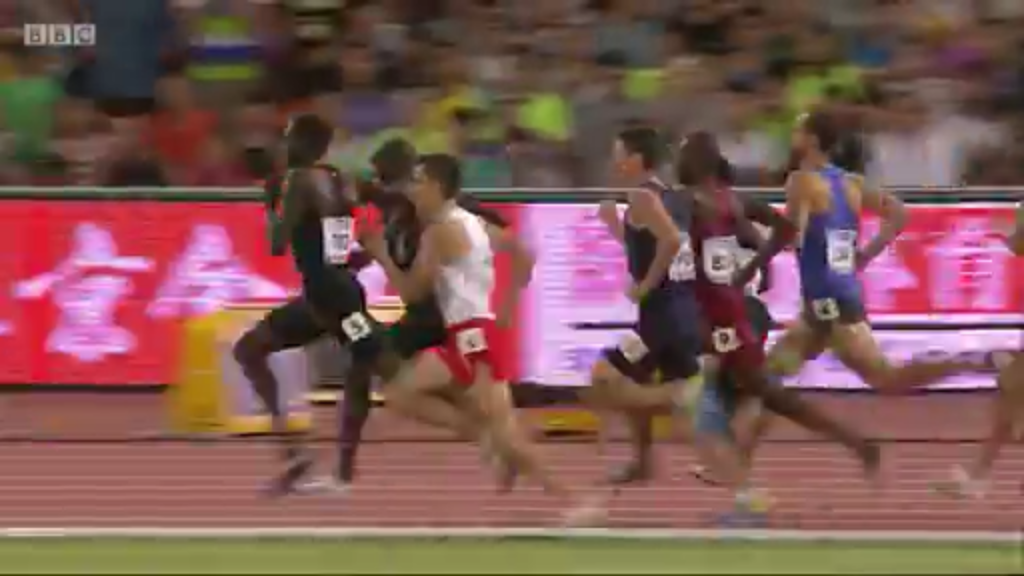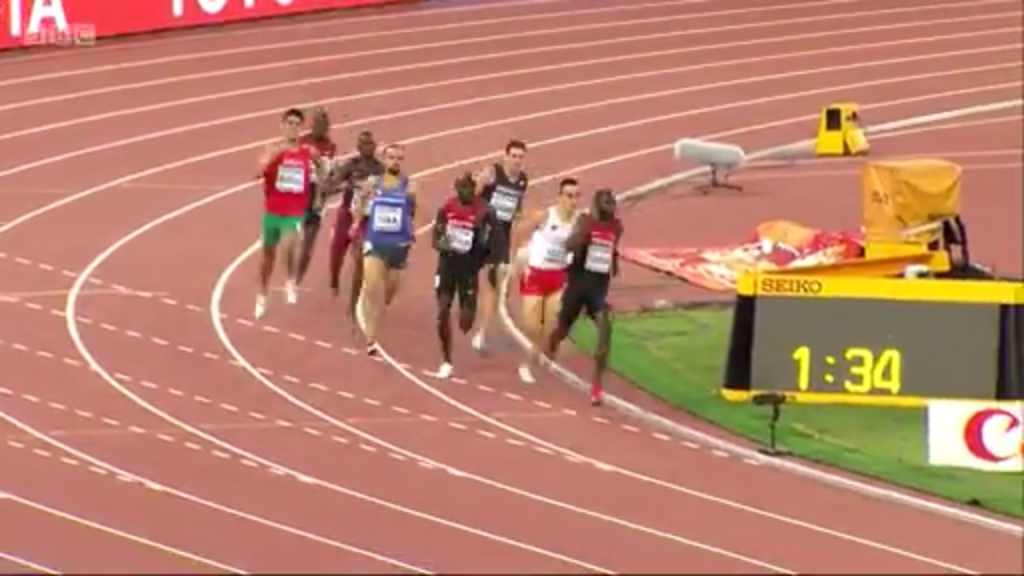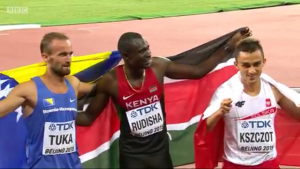Negative Split, No Problem: The King Is Far From Dead – David Rudisha Wins Third Global Title With 24.36 Final 200
Amel Tuka Wins Historic First Medal For Bosnia and Herzegovina
By LetsRun.com
August 25, 2015
BEIJING – King David is back.
In his first global championship since setting the world record at the 2012 London Olympics, Kenya’s David Rudisha returned to the winner’s podium and silenced the critics by winning the men’s 800 tonight in 1:45.84 at the Bird’s Nest at the 2015 IAAF World Championships. Poland’s Adam Ksczot got the silver in 1:46.08 and 2015 world leader Amel Tuka got the bronze in 1:46.30 – a historic first-ever medal for Bosnia and Herzegovina.
Just as in London, Rudisha led wire-to-wire, but this was a far different race than the world record 1:40.91 he ran three years ago. He controlled the race by slowing things down in the front, running a big negative split and outkicking the kickers as he came through 400 in a glacial 54.17 — almost five seconds slower than his 49.28 in London — before closing it out in style, with a 51.67 final 400, covering the final 200 in a super fast 24.36 seonds.
Coming into these championships, Rudisha was seen by many pundits as vulnerable. He had just the 8th-fastest seasonal best time of the year, 1:43.58, which had been set in his first Diamond League race of the year in New York way back on June 13, and had lost three straight races, in Lausanne, London and Nairobi (Kenyan Trials). But track and field is a sport mainly about one thing – rising to the occasion in a single race in mid- to late-August and Rudisha did that again tonight in Beijing. Sure, it didn’t hurt that two of Rudisha’s biggest rivals, 2013 world champion Mo Aman of Ethiopia and 2012 Olympic silver medallist Nijel Amos of Botswana, had failed to make the final. But making the final is a massive part of succeeding in the 800.
The Race
Rudisha didn’t blast out of the gate, but he was quick enough over the first 200 (25.07) — and the field was deferential enough (more on that later) – for him to have the lead a quarter of the way through the race. Tuka, as is his custom, went straight to the back and hit 200 in 25.67. Rudisha’s countryman Ferguson Rotich, who beat Rudisha at the Kenyan Trials, battled him for the lead around the second turn of the first lap, but could not wrest it from him. Rudisha led at 400 in 54.17, meaning his 2nd 200 was an incredibly slow 29.10, with Rotich behind him; the rest of the field was tightly packed behind the two Kenyans, with Tuka bringing up the rear in 54.72.
On the backstretch, the pace increased and Tuka began to move forward on the outside as the pace picked up. Poland’s Ksczot was in third boxed in behind Rudisha and getting antsy and tried to move by Rudisha on the inside, and Rudisha hit the gas. He passed 600 in 1:21.50 (26.78 from 600 to 800) with Rotich and Kszczot behind him and Tuka gaining a head of steam on their outside in fourth.
Coming off the turn, gold was up for grabs but Rudisha continued to blaze and soon gained a few meters of separation. Kszczot moved into second as Rotich, who led Kszczot in the final turn, did not protect lane one and Kszczot finally was able to fine the daylight he’d sought against Rudisha and passed on the inside. Tuka drifted out to lane 3 to get a clear lane for sprinting. Rudisha wasn’t breaking down though, holding his form all the way to the finish line for the victory, closing out a great final 200 in 24.36 to get the win. Kszczot was able to steal perhaps a meter back on Rudisha, which was enough to secure a clear silver medal to go with the one he won on home turf at World Indoors last year. Tuka went by Rotich with around 30 meters to go and held on for bronze despite a brave lean by Rotich (the two were separated by just .05).
Results
| Pl. | Athlete / Team | Cnt. | Birth | Result | Score | |
|---|---|---|---|---|---|---|
| 1. | David RUDISHA | KEN | 88 | 1:45.84 | 1148 | |
| 2. | Adam KSZCZOT | POL | 89 | 1:46.08 | 1141 | |
| 3. | Amel TUKA | BIH | 91 | 1:46.30 | 1134 | |
| 4. | Ferguson Rotich CHERUIYOT | KEN | 89 | 1:46.35 | 1133 | |
| 5. | Pierre-Ambroise BOSSE | FRA | 92 | 1:46.63 | 1124 | |
| 6. | Musaeb Abdulrahman BALLA | QAT | 89 | 1:47.01 | 1113 | |
| 7. | Nader BELHANBEL | MAR | 94 | 1:47.09 | 1111 | |
| 8. | Alfred KIPKETER | KEN | 96 | 1:47.66 | 1094 |
https://www.youtube.com/watch?v=XzPgJBHy2z4
Quick Take #1: The brilliance of David Rudisha
When we look back at Rudisha’s career, his 2012 Olympic gold will be the first race we remember, but this race was almost as beautiful. Whereas London was utter domination, one man imposing his will on seven, what Rudisha did tonight was impressive in a totally different way.
Since coming back from his injury in May 2014, Rudisha had tried to emulate his pre-injury tactic of pushing hard from the gun to mixed results. In Beijing, he changed things up. In the first two rounds, Rudisha went to the front early but kept the pace slow as none of his competitors had the audacity to go by him on the first lap. Then, with 200 to go, Rudisha opened up his long stride, using his stride and positioning advantage to power to the win. He did the exact same thing in the final tonight, and no one could match his superior speed in the final 200.
One way to measure a champion is by gold medals; Rudisha now has three. Another is to measure how they adjust and still find a way to win even as they age. Rudisha’s old approach wasn’t working and the biggest question was whether he could still win gold with a different tactic. The 2015 version of Rudisha may not have the ability to run 1:40 from the front, but he’s still got the best top-end speed of any 800 runner in the world. How to take advantage of that? Stay on the inside and turn it into a 200-meter race. That’s exactly what Rudisha did, and no one could touch him tonight.
After the race, we had a seven and a half minute chat with Rudisha’s agent James Templeton as we waited for Rudisha to come through the mixed zone. You can listen to it below if you have time but let us share a few highlights.
Templeton said that “the last month has gone beautifully. It’s one of those situations where everything comes together very nicely.” He said after losing in London that Rudisha was upbeat and had said, “It’s coming up. I can feel it.”
At the Kenyan Trials, Templeton thought Rudisha had “looked magnificent”; Rudisha didn’t win there but Templeton implied that was only because it wasn’t important for Rudisha to win the race. And then after the Trials, Rudisha really turned it on and had some great sessions that included running 300s in 33 – sessions that he hadn’t been “strong enough and fit enough to do” earlier in the year.
“[Most] importantly the 33s felt like 35s a month or so ago. You get huge confidence from that,” said Templeton. “He knew, but we didn’t talk about it, that he’s in 44-second 400 meter shape. Now he wasn’t in 44-second shape in Lausanne or London. So he was very supremely confident in his speed.”
“[Years ago] he used to laugh, ‘Oh people don’t think I can kick. I can win these races with a kick.'”
Rudisha has apparently always beeen confident in his kick and he showed why tonight. The interesting thing about tonight’s win is it possibly might make Rudisha more dangerous for Rio 2016. As Templeton said, “Now going into Rio, in the final next year, you’ll be standing on the line [thinking], ‘Is Rudisha going to run 49 or 54?’ He controls it. He gets to the front and he won’t let them pass. When you try to pass them, he’ll get there [first]. He’ll accelerate wherever he needs to.”
https://soundcloud.com/letsrun-com/david-rudishas-agent-james
As for Rudisha, he answered questions for six and a half minutes himself in the mixed zone (audio embedded below as well). He said he was extremely confident in his plan to turn it on over the last 150 as he had great faith in his speed.
“I knew the guys didn’t have my speed and there was nothing much to worry about [at the end] because I’ve been building on my speed for the last month,” said Rudisha. “In the beginning of the season, I was working on my endurance and in a couple of races this year, I was struggling in the last 100 so when I went back [to Kenya] I concentrated solely on my speed and my speed came back when I needed it. And it was so important for me to come back here and win after two years of disappointment with injury.”
Rudisha said that earlier in the year “there was a little bit of doubt” as whenever he tried to work on his speed, he’d feel pain coming on in his knee and be forced to back off, but it came together “in the last month” and that his workouts had given him a lot of confidence.
“I just wanted to win it comfortably without any stresses,” said Rudisha, who shocked the media by saying he only decided to slow the race down just before the start.
“[When I came to Beijing], I was thinking about how I was going to run. I had a lot of thinking going on in my mind, but I just had to decide just before the race whether I was going to push it or take it easy and then sprint in the last 100, but I was very much confident because of my speed. That is the thing that was worrying me before. But when I [got] my speed [back] I think that was everything to me,” said Rudisha who dismissed the suggestion that he ran tactically because he’d lost early season rabbited races. “Not really. Not really. In the [early] season, what I was lacking was just the finishing speed. I was coming all the way to the last 100 meters and I just lacked my sprint, but now that I’ve got my speed [back], I think I [could] handle even a fast race and then sprint in the last 150, 100 meters.”
https://soundcloud.com/letsrun-com/david-rudisha-talks-after
Quick Take #2: It paid to have multiple gold medal coming into Beijing
Rudisha’s win kept with the theme that has been dominating the first few days of the competition here in Beijing – that past multi-time champions have been coming through in golden fashion.
Prior to tonight, there had been four running finals on the track – the men’s and women’s 10,000, men’s and women’s 100 and men’s steeplechase – and all of those events were won by previous champions, in fact multiple-time champions. Usain Bolt’s gold was his 10th individual global (Worlds or Olympics) outdoor track gold, Ezekiel Kemboi and Mo Farah won their sixth golds and Shelly-Ann Fraser-Pryce won her fifth and Vivian Cheruiyot won her fourth. Rudisha’s win tonight was his third global gold (2011 and 2015 Worlds, 2012 Olympics).
The only thing stopping that multiple champion coming through theme was the force known as Genzebe Dibaba, the women’s 1500 world record holder, who won the women’s 1500 gold in the race immediately before the men’s 800. Of course, there was no multiple time champion in the women’s 1500 that could keep the streak alive – well technically there was as 40-year old Russian Tatyana Tomashova technically won in 2003 and 2005 but she’s a known doper and might lose her 2005 title.
Quick Take #3: Adam Kszczot ran extremely well for a much-deserved silver. As good as his race was, his post-race interview was even better. “The toughest thing in the slow races is to have the big cojones….If you have big balls, you can keep calm, do what you do and run.”
Up until this point in his career, Kszczot may not have grabbed the headlines like Rudisha, Aman or Amos, but he’s been very good for several years now (he ran his PB of 1:43.30 back in 2011) and won Euros impressively last summer.
He’d struggled in global championships until tonight, however, as he missed the final at Worlds in 2009 and 2013 as well as the 2012 Olympics. He did make the final in 2011, but only finished 6th. Now he’s a outdoor World Championship silver medalist (he also won silver at World indoors on home soil in 2014) and the only guy ahead of him on the podium is the greatest 800 runner of all-time. Not a bad night for the Pole.
He did it by running a smart race, not leaving the rail on the second lap despite some extremely tight quarters on the backstretch. Despite being thrilled to have won silver, Ksczot wasn’t entirely satisfied. He was disappointed with how everyone else in the race just let Rudisha dictate the race.
“I wanted to attack with 250 to go. Why [are the] other runners so passive?” said Kszczot. “Why they do that, I do not know. [There’s] 250 meteres to go and they are still, ‘Ok David, take your time.'”
When asked why he didn’t do something about it, Kszczot said that he tried. “I could only attack [by going into the infield]. I tried but I stepped on the metal line. The toughest thing in the slow races is to have the big cojones. Because if you are running [in a slow races], there are runners all around you, and you have to stay focused and [continue to run] easy until the last 100. And [often] you don’t know what to do. If they are going to run around me, what am I going to do? What am I going to do?
“So if you have big balls, you can keep calm, do what you do and run.”
The next year should be a fun one on the circuit as we’ll get to see if Kszczot does indeed try to challenge Rudisha. “I was pissed off that no one would pass him with 250 to go. If I had been on the outer curve of runners, I would have done it.
“I’m good in the slow races, I’m good in the fast races. I can do everything.”
Listen to the all-time classic interview here:
https://soundcloud.com/letsrun-com/adam-kszcot-talks-after
Quick Take #4: Who is Amel Tuka?
Tuka is now a World Championship bronze medallist and 11th-fastest man in history (1:42.51) but before this year, he was largely an unknown. The IAAF had a nice profile of Tuka on their website last month but here is a CliffsNotes version of his storybased on that an our chat with him after the semis.
At age 17, he ran a 400 with basically no training (he has spent six years in karate and has a black belt and had played soccer with his friends) and impressed with a 53 flat in regular shoes (The IAAF says it was a 50 but Tuka told us on Sunday it was 53). Encouraged by that, he picked up the sport and started training as a runner in January of 2009 with a local athletics club. He ran 1:51.04 in 2010 at age 19. He improved to 1:48.31 in 2012 and then really had a big breakthrough two years ago at the European u-23 Championships as he went from 1:48 to an impressive 1:46.29 to take the bronze (winner was France’s Pierre-Ambroise Bosse in 1:45.79). That race made an impression on Italian coach Gianni Ghidini and he invited Tuka to join his group in Italy just short of two years ago. In the past, Ghidini coached 2008 Olympic champ Wilfred Bungei as well as 1994 European champ Andrea Benvenuti. Tuka credits Ghidini with a lot of his successs.
Last year, Tuka made big gains in training but the coach wasn’t satisfied with his 1:46.12 pb and sixth-place showing at Europeans. This year, Tuka has more than made up for last year’s disappointment as he’s far exceeded expectations. After Tuka ran his world-leading 1:42.54 to get the win in Monaco by running two nearly-even 51-second laps, his coach said to the IAAF, “To sum up, two laps nearly equal. With [a] final authority that struck me. I knew it was in progress but I did not think of a time like this.”
You can watch Tuka talk about his introduction to running with LetsRun.com on Sunday below:
After tonight’s race, Tuka was thrilled with bronze – as it was a historic first-ever medal for his country. As he said yesterday, he’s still inexperienced in meets with lots of rounds so there is room for improvement. Tuka said he was happy that his good friend David Rudisha had won. That confused us as the two had never raced each other before tonight so we asked Tuka how he knew Rudisha. Tuka revealed that Rudisha had come up to him and congratulated him on his great season. Talk about a class act.
Tuka on his friendship with Rudisha:
Not everyone is thrilled with Duka’s breakthrough this year. France’s Pierre-Ambroise Bosse doesn’t appear to be a fan and seemingly is wondering if Tuka’s improvement is too good to be true as shown on this messageboard thread: MB: Pierre Ambroise Bosse pointing fingers against Amel Tuka on French TV.
Other 800 related threads from our world famous messageboard: *Still doubting Rudisha’s 33-second 300’s? He closed in 24 to win the 800!
*Rudisha needs Alfred’s help to win 800.







